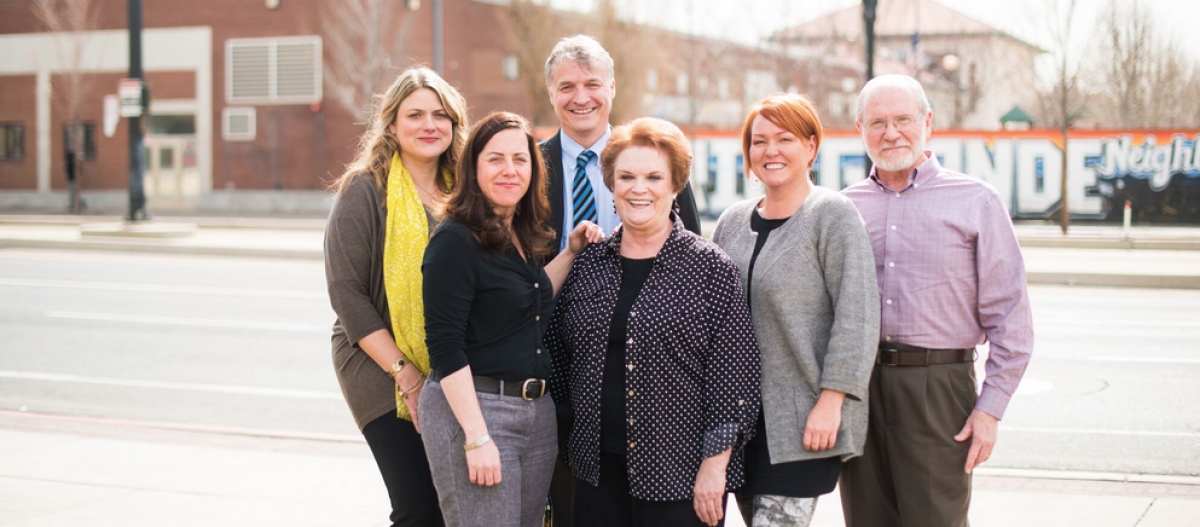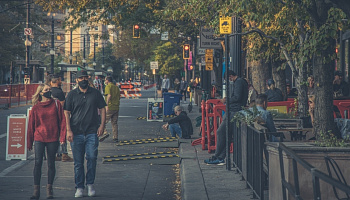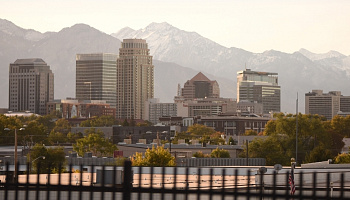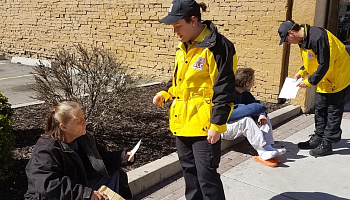Our city is at its best when we come together to solve big problems.
A strong sense of community stewardship and teamwork helps to set downtown apart from other urban centers in the West. As our city has looked for new ways to help homeless individuals and families, a team-based approach is making a difference in programs designed to move people out of homelessness and into mainstream life.
Clean Team
Life on the streets can be dirty for Utah’s homeless population. Limited bathrooms and trash services sometimes create a lack of cleanliness in and around Pioneer Park and the Rio Grande Street. In September 2013, the Downtown Alliance, Salt Lake City and homeless service providers worked with Advantage Services created the Clean Team to help clean up the shelter neighborhood. Members of the Clean Team include 20 homeless residents and those living in supportive housing who have been hired to work part-time cleaning up trash and performing small property maintenance around the Rio Grande area and in Pioneer Park at 350 South 300 West.
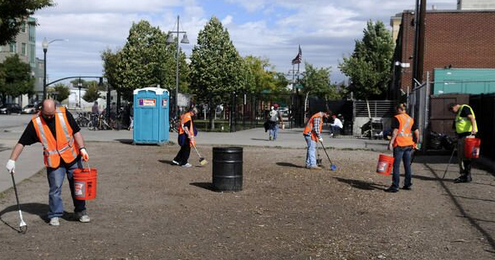
Camille Winnie, director of community services for the Downtown Alliance, helped to launch the program and has watched it make a difference in the lives of the workers and in the larger community.
“The goals of this program are to help team members get a resume, acquire some work experience and a positive reference and to introduce them to new things that they might not have done on their own,” Winnie says.
Advantage Services employs and services the Clean Team. Members earn minimum-wage and work four-hour shifts during the weekdays, picking up trash, shoveling snow, pulling weeds and power-washing sidewalks and buildings. There is even room for job growth within this program. Work on the Clean Team can lead to other employment opportunities with Advantage Services.
“This has been a productive program allowing people to take the next steps to get out of homelessness,” Winnie adds. “People have the opportunity and resources to better themselves and the community where they reside.”
“As a downtown resident, I have seen a real improvement in my neighborhood from the Clean Team,” said Christian Harrison, chair of the Downtown Community Council. “This program is literally cleaning up the neighborhood and giving people a chance to improve their own lives.”
Green Team
Last year, the Downtown Alliance, Wasatch Community Gardens (WCG) and Advantage Services joined forces to build on the success of the Clean Team with a new garden-based job training program for homeless women called the Green Team. Funded by Salt Lake City and on land donated by the city’s Redevelopment Agency, this new 10-month program empowers homeless women through urban farm education, job skills training and employment. “This is a transitional job program that is being used for women to gain skills to transition into a full-time job,” states Winnie. “The Green Team facilitates employment opportunities for homeless women and creates vibrant community spaces and community involvement.”
The plot, located behind The Gateway outdoor mall at 100 South 625 West, is in the process of being built. It is an ideal location for a job training garden since it is within walking distance of the majority of homeless services in Salt Lake City. This garden will enhance neighborhood appeal for current and future residents of the new housing developments in the neighborhood as well as for other downtown residents. Eight women are hired to work during the growing season, February through November. Green Team members learn to grow herbs and produce and receive life skills training on topics like personal resource management, health and wellness and interpersonal skills. They are in class one day a week and spend the other four days in the garden. Additionally, participants have a field trip each month to visit potential employers in food-related businesses in Salt Lake City. Crops grown in the Green Team garden will be sold at a subsidized rate to the Salt Lake Head Start program and will be used as a resource for the meals served at area shelters. Head Start currently produces over 4,000 hot, healthy meals each day for the children in their program.
It takes a village to make this garden grow. WCG manages the gardening operations and Advantage Services provides the hiring and HR functions, future job placement and job training and education components of the program. Downtown Alliance assists Advantage Services with their functions and helps establish collaborative partnerships with local businesses, residents and organizations.
HOST
Creating jobs is an obvious way for the less fortunate to earn money, but so is panhandling. Panhandling is an epidemic across the nation and Salt Lake City is not immune. Usually donating spare change to an individual only enhances their problem. This is where the Homeless Outreach Service Team (HOST) program is introduced to help “turn spare change into real change.”
HOST is a proactive and collaborative effort to move the community in Salt Lake City into a partnership with the police and homeless service providers to connect homeless individuals with social services and resources. Bright red donation meters are located throughout downtown and allow people to give spare change to the homeless rather than to those who ask for it on the streets. All money collected in the meters goes to the Pamela J. Atkinson foundation and are dispersed to local homeless services providers that provide help for those that need it most.
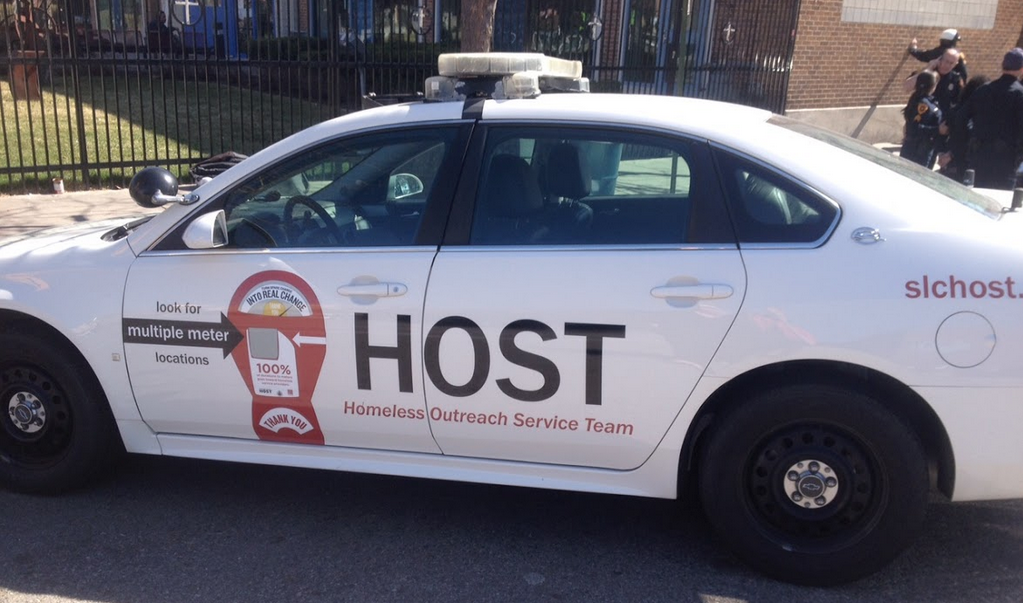
“This project was started based on the reality that no one ever panhandled their way out of homelessness,” Winnie says. “It’s teaching our community a better way to help.”
In 2010, the first 10 meters were installed. Six years later, 40 meters pepper the downtown scene. Zions Bank was the first to partner with Salt Lake City and the Downtown Alliance on the donation meters. Meters, street signs and stickers direct donors to a website (http://www.slchost.org/) if you don’t have change to spare. The campaign #HandupNotHandout has been created to get resources to the right people in our community who can make the biggest impact.
Jobs, volunteers and donations are ways to help those who face homelessness. But what is the best way to end homelessness? “Give them housing,” says Celeste Eggert, director of development for the Road Home. “Shelter is often the first step on the road home.”
The Road Home
The Road Home is a lead homeless service provider for the Salt Lake region. As a private non-profit social service agency, the Road Home offers emergency shelter and low-income housing options to single men, women and families experiencing homelessness. Staff provide personalized case management to help their clients identify and overcome the obstacles that have led them to becoming homeless. The shelter is open every day of the year and doesn’t turn people away if they are in need of a place to stay.
Logging 18 years at the largest homeless shelter in Utah has given Eggert a pretty good grasp on the topic. “For 90% of the clients we serve, they experience a short, one time period of homelessness and just need a little assistance to get back on their feet and then we never see them again,” says Eggert. “We find that the other 10% have something deeper causing them to become homeless and stay homeless for an extended period of time.” Case managers work closely with these clients to help connect them with services that will help them overcome the barriers causing them to be homeless.
That connection, with services and resources, can only happen in an environment that is built on teams. No individual or organization can solve homelessness singlehandedly. It takes a strategic and thoughtful approach that leverages the strengths of multiple entities to help people who lose their homes.
When an individual or family comes to the Road Home, they are provided with basic needs. The emergency services shelter offers assistance to low-income and homeless individuals on a walk-in basis while the family shelter helps meet the needs for families with children. Case managers are assigned to each family and select single clients to help them develop a plan for housing.
Over the next few years, the Road Home will continue to offer services as part of an integrated team approach that also includes other agencies, organizations and government entities. Instead of providing emergency shelter in a single location, additional facilities will be built that will care for distinct populations and additional resources will go towards preventing homelessness and treating the root causes of homelessness instead of just providing emergency services.
The Road Home is already lauded as a national leader for finding solutions for people who have been homeless for a year or more. In the Rapid Rehousing program, families receive a small amount of funding to allow payments for utility debts, deposits and rental assistance as well as a strong case management component. Once in housing, families rarely need to return to emergency shelter again.
For the small number of families and individuals who have a greater need for supportive services, the Road Home manages several Permanent Supportive Housing programs, including Palmer Court. Palmer Court is a 201 unit apartment complex for formerly chronically homeless families and individuals with mental illness and substance abuse disorders.
As part of a regional team-based approach, the Road Home will work even more closely with other providers like Catholic Community Services, The Fourth Street Clinic, the Salt Lake Mission, Crossroads Urban Center and local, regional and state governments to identify concrete goals to prevent people from becoming homeless and to get them stabilized and into housing as quickly as possible.
“The services that these teams offer exist by help and generosity of our community,” says Eggert. “The city and volunteers step up to support all of us.”

